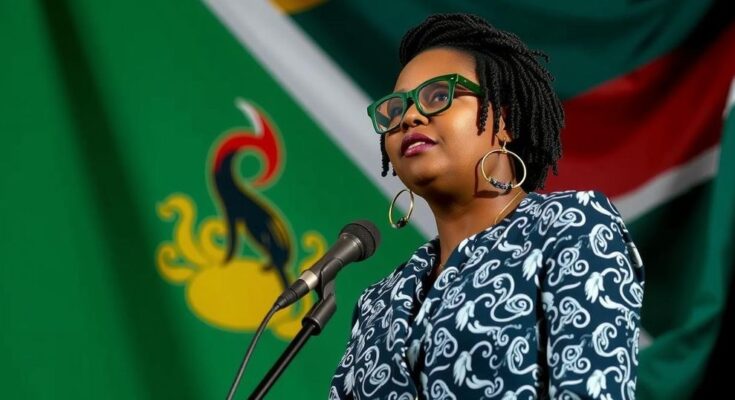Namibia is poised to elect its first female president, Netumbo Nandi-Ndaitwah, who is currently leading in a disputed election. With 65.57 percent of votes counted, she has 54.82 percent but may face a run-off if she does not exceed 50 percent. The opposition rejects the election’s validity citing irregularities, which could lead to legal challenges.
Namibia is on the verge of electing its first female president, with Netumbo Nandi-Ndaitwah, who is currently serving as the Vice President, leading the electoral race. As of Tuesday, 65.57 percent of votes were counted, revealing Nandi-Ndaitwah in the lead with 54.82 percent of the vote. However, if her percentage falls below the crucial 50 percent mark, a run-off election may be required. Voting disruptions that occurred at polling stations, resulting from technical difficulties and a shortage of ballot papers, have complicated the counting process.
Despite an overall voter turnout of 73 percent from nearly 1.5 million registered voters, opposition parties, particularly the Independent Patriots for Change (IPC) led by Panduleni Itula, have denounced the election process as fraudulent, citing significant irregularities. With 79 out of 121 constituencies counted, SWAPO, the ruling party, has managed to secure 56.38 percent of the National Assembly votes thus far. Claims of illegitimacy concerning the voting extensions and logistics during the elections have been officially brought forward by the IPC, which asserts a myriad of election irregularities. The implications of these accusations may lead to a legal challenge of the electoral results.
Namibia, located in Southern Africa, has a history of stable democratic elections, having achieved independence from apartheid South Africa in 1990. The ruling SWAPO party has dominated the political landscape since that time. However, recent economic challenges, including high youth unemployment and persistent social inequalities, have led to increasing discontent among young voters, impacting electoral dynamics. The current presidential election is particularly significant as it could usher in the country’s first female leader, signaling a demographic shift within its political framework. The ongoing disputes surrounding the election results highlight tensions between the opposition and the governing party, along with concerns about the integrity of the electoral process.
As Namibia approaches the conclusion of its disputed presidential elections, Netumbo Nandi-Ndaitwah holds a significant lead, yet the prospect of a run-off looms if she does not achieve over 50 percent of the vote. The opposition’s claims of electoral fraud and irregularities have raised serious questions about the legitimacy of the election process. The outcome of this election could have profound implications for the nation’s political direction, particularly concerning representation of women in leadership roles, amid rising tensions regarding governance and electoral fairness.
Original Source: www.aljazeera.com




